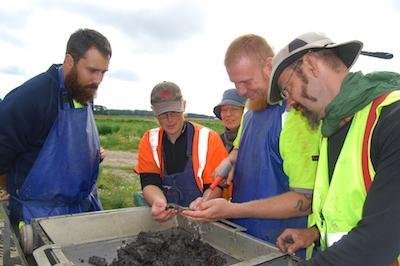Researchers sift through the remains of a fish fermentation pit found at a 9,200-year-old settlement in Sweden. Photo by Lund University
LUND, Sweden, Feb. 8 (UPI) -- An archaeological site in Sweden has revealed 200,000 fish bones, suggesting the ancient people living in the region were more sophisticated than previously thought.
The bones were excavated and analyzed by a team of researchers from Sweden's Lund University. The finding are forcing scientists to rethink -- and perhaps rewrite -- Nordic prehistory.
Prior to the discovery, researchers suggested the inhabitants of the 9,200 year-old settlement in Blekinge, Sweden, were not entirely settled -- unlike the societies of farmers in the Middle East. But the bones suggest these early Nordic peoples were fermenting food much early than previously thought.
"Our findings of large-scale fish fermentation, a traditional way of preserving fish, indicate that not only was this area settled at that time, it was also able to support a large community," lead researcher Adam Boethius said in a press release.
The type of fermentation employed at the ancient site is more primitive than later strategies, as the early Nordic settlers were without salt and ceramic vessels. The fish were acidified using pine bark and seal fat, then wrapped in seal and wild boar skins, thrown into a pit and buried with muddy soil. This technique requires a suitably cold climate.
The strategy also served to preserve exceptionally small and delicate bones. It's unusual for archaeologists to find such well-preserved fish fossils.
Researchers say the discovery shifts the timeline of social development, with prehistoric Nordic settlements on par with the advanced settlement excavated in the Levant region of the eastern Mediterranean.
"These findings indicate a different time line, with Nordic foragers settling much earlier and starting to take advantage of the lakes and sea to harvest and process fish," Boethius said.
The findings were detailed in a new paper, published this week in the Journal of Archaeological Science.















